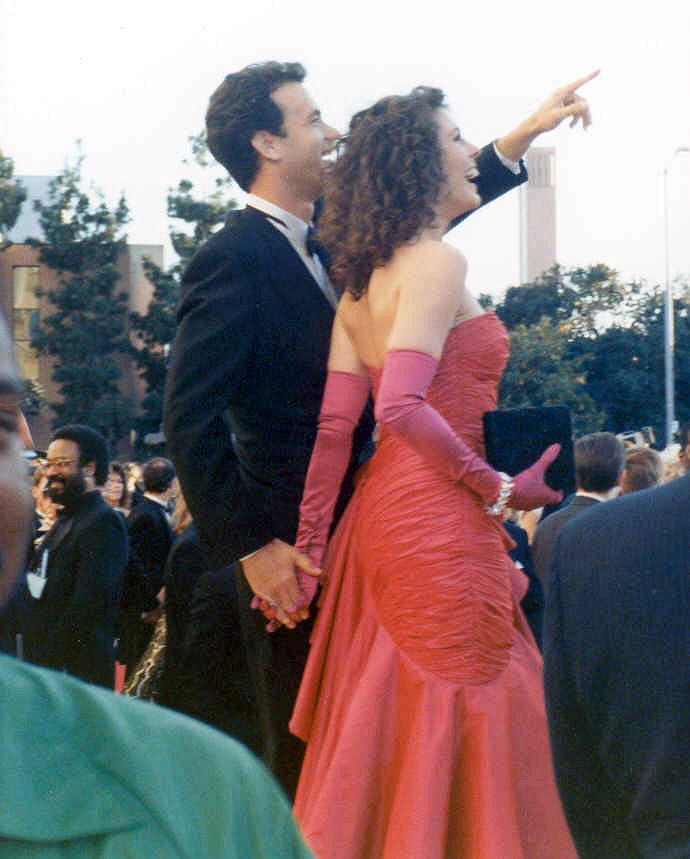Tom Hanks
Tom Hanks

Thomas Jeffrey Hanks, born on July 9, 1956, in Concord, California, is a highly acclaimed American actor and filmmaker. Renowned for his versatility in both comedic and dramatic roles, he has become one of the most beloved and recognizable figures in the entertainment industry, earning him the status of an American cultural icon.
Hanks achieved breakthrough success with leading roles in a string of comedy films that garnered widespread acclaim, including "Splash" (1984), "The Money Pit" (1986), "Big" (1988), and "A League of Their Own" (1992). His portrayal of a gay lawyer battling AIDS in "Philadelphia" (1993) earned him his first Academy Award for Best Actor, followed by his iconic performance as the titular character in "Forrest Gump" (1994), which won him his second consecutive Oscar in the same category.
Throughout his illustrious career, Hanks has collaborated with esteemed directors such as Steven Spielberg, Ron Howard, Nora Ephron, and Robert Zemeckis on various projects. His partnership with Spielberg resulted in critically acclaimed films such as "Saving Private Ryan" (1998), "Catch Me If You Can" (2002), and "Bridge of Spies" (2015), among others.
In addition to his film work, Hanks has made significant contributions to television, winning multiple Primetime Emmy Awards for producing acclaimed limited series and television movies, including "Band of Brothers" (2001), "John Adams" (2008), and "Game Change" (2012), among others.
As a filmmaker, Hanks directed the comedy "That Thing You Do!" (1996) and the romantic comedy "Larry Crowne" (2011), both of which he also starred in. In 1998, he founded his production company, Playtone, which has since developed a successful partnership with HBO for television projects.
Hanks' illustrious career has been decorated with numerous accolades, including the AFI Life Achievement Award, the Kennedy Center Honor, the Presidential Medal of Freedom, and the Golden Globe Cecil B. DeMille Award, among others. He continues to captivate audiences with his remarkable performances and remains one of the most revered figures in Hollywood.

Tom Hanks, born on July 9, 1956, in Concord, California, to Janet Marylyn (née Frager) and Amos "Bud" Hanks, grew up in a dynamic family environment marked by frequent moves and his parents' divorce when he was just a child. Hanks, along with his siblings, experienced these early life changes, with some siblings staying with their father and others with their mother.
Hanks' childhood was characterized by various religious influences, including Catholicism and Mormonism, and he himself briefly identified as a devout evangelical during his teenage years. Despite struggling with shyness and feeling like an outsider during his school days, Hanks found solace and expression through acting in school plays, demonstrating an early passion for the craft.
His fascination with movies was nurtured during his upbringing in the Bay Area, where he fondly remembers watching films at the local Alameda Theatre. Hanks pursued his interest in theater by studying at Chabot College and later transferring to California State University, Sacramento. However, his true immersion in the world of acting came during an internship at the Great Lakes Theater Festival in Cleveland, Ohio, where he gained invaluable experience in various aspects of theater production.
Hanks' dedication to his craft and his natural talent were evident early on, earning him accolades such as the Cleveland Critics Circle Award for Best Actor for his performance in Shakespeare's "The Two Gentlemen of Verona." Despite dropping out of college to pursue his passion for acting, Hanks' commitment and talent ultimately led to his remarkable success in the entertainment industry, solidifying his status as one of Hollywood's most esteemed actors.

Tom Hanks' career trajectory in the late 1970s and early 1980s saw him transitioning from theater to television and eventually to film, where he quickly made a name for himself with a series of diverse roles.
In 1979, Hanks moved to New York City and began his foray into film with appearances in the slasher film "He Knows You're Alone" and the television movie "Mazes and Monsters." He also landed a lead role in the Riverside Shakespeare Company's production of Niccolò Machiavelli's "The Mandrake." However, it was his role in the ABC television pilot "Bosom Buddies" that propelled him to broader recognition. The show, in which Hanks starred alongside Peter Scolari, garnered critical acclaim despite modest ratings.
Hanks' big break came with the romantic comedy "Splash" in 1984, directed by Ron Howard. His performance in the lead role solidified his status as a rising star in Hollywood. This success was followed by another hit, the sex comedy "Bachelor Party," further establishing Hanks as a bankable leading man.
Throughout the mid-1980s, Hanks continued to showcase his versatility, taking on both comedic and dramatic roles. He appeared in the fantasy comedy "Big" in 1988, earning his first Academy Award nomination for Best Actor. Despite experiencing a string of box-office disappointments with films like "The 'Burbs," "Joe Versus the Volcano," and "The Bonfire of the Vanities," Hanks' talent and potential were evident to both audiences and industry insiders alike.
While some of his early films may not have achieved commercial success, Hanks' commitment to his craft and his ability to tackle a range of roles would ultimately lead to his emergence as one of Hollywood's most beloved and respected actors.

Tom Hanks experienced a resurgence in his career with notable performances in the early 1990s, solidifying his status as one of Hollywood's most versatile and respected actors.
In 1992, Hanks starred in "A League of Their Own," portraying a washed-up baseball legend turned manager. The film was well-received, marking Hanks' return to the spotlight. He followed this success with two pivotal roles that would define his "modern era" of acting, as he described it.
First, in "Sleepless in Seattle," Hanks charmed audiences as a widower who finds love through unconventional means. The film was a blockbuster hit and cemented Hanks' reputation as a leading man in romantic comedies. Critics praised his performance, recognizing him as one of the premier stars of the genre.
However, it was his role in "Philadelphia" that showcased Hanks' range and depth as an actor. He portrayed a gay lawyer with AIDS who fights against discrimination in the legal system. Hanks underwent a physical transformation for the role, losing weight and altering his appearance to accurately depict the character's illness. His performance was universally acclaimed, earning him the Academy Award for Best Actor and solidifying his status as one of Hollywood's most talented actors.
Following his success in "Philadelphia," Hanks delivered another iconic performance in "Forrest Gump" (1994). Portraying the titular character, Hanks captivated audiences with his portrayal of a simple-minded but kind-hearted man navigating through significant historical events. The film was a massive commercial success and earned Hanks his second consecutive Academy Award for Best Actor, a rare feat in Hollywood history.
Continuing his streak of acclaimed roles, Hanks starred as astronaut Jim Lovell in "Apollo 13" (1995), further showcasing his ability to command the screen in dramatic roles. Additionally, he lent his voice to the beloved character Sheriff Woody in Disney/Pixar's animated hit "Toy Story," demonstrating his versatility across different mediums.
Overall, the early 1990s marked a pivotal period in Tom Hanks' career, with a string of critically acclaimed performances that solidified his reputation as one of Hollywood's most accomplished actors.

References
- "PM meets Tom Hanks, now a Greek citizen". Ekathimerini. July 26, 2020.
- ^ Phillips, Kendall R. (2004). Framing Public Memory. University of Alabama Press. p. 214. ISBN 9780817313890.
- ^ "Tom Hanks Movie Box Office Results". Box Office Mojo. Retrieved January 25, 2019.
- ^ Lisa, Andrew (October 22, 2020). "50 Highest-Grossing Actors of All Time". Yahoo! Finance. Retrieved March 23, 2021.
- ^ "President Obama Names Recipients of the Presidential Medal of Freedom". whitehouse.gov. November 16, 2016. Retrieved November 16, 2016 – via National Archives.
- ^ Mikelbank, Peter (May 17, 2016). "Tom Hanks to Receive France's Highest Honor for His Work Highlighting World War II". People. Retrieved January 6, 2017.
- ^ "Tom Hanks Injects Class Into Golden Globes With Cecil B. DeMille Speech, Extolling Film Craft And 'Love Boat'". Deadline Hollywood. January 6, 2020. Retrieved January 22, 2023.







































